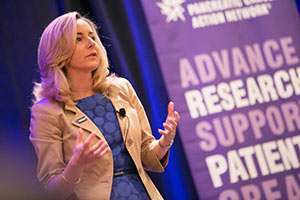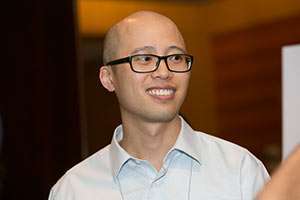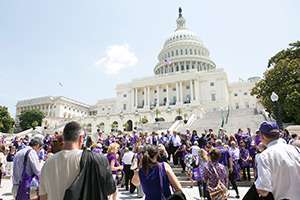A Message from the President and CEO:
Our guest columnist this month is Eugene Koay, MD, PhD. Dr. Koay is an assistant professor of radiation oncology at The University of Texas MD Anderson Cancer Center in Houston, Texas. He was awarded the 2014 Skip Viragh Career Development Award from the Pancreatic Cancer Action Network to support his research to predict and monitor pancreatic cancer patients’ responses to treatment. He attended his first Advocacy Day a few weeks ago, and we asked him to keep a journal of his experiences and impressions from the event. He was kind enough to share his candid thoughts on the importance of Advocacy Day and his participation as a pancreatic cancer researcher. Please enjoy!
With warm regards,
Julie Fleshman
Julie Fleshman, JD, MBA
President and CEO
Pancreatic Cancer Action Network
An Advocacy Day Journal
by Dr. Eugene Koay
Sunday, June 15 – On the way to Advocacy Day
8:20 a.m. Ready to make a difference
On the plane with lots of stuff on my mind! I’m a little sad about missing Father’s Day with my family, excited about launching my own lab on July 1 after finishing my residency in radiation oncology just a few days ago, and maybe just a bit nervous about what the next few days will bring on Capitol Hill.
I’m also feeling really grateful to have private grant support from day one of my laboratory start-up, especially in this climate of uncertainty around funding from the National Cancer Institute. NCI will always be the biggest source of support for biomedical cancer research, though. On Advocacy Day, I hope that we can help our government officials understand why NCI funding is so critical to making progress in a disease as challenging as pancreatic cancer.
Monday, June 16 – Training day
8:45 a.m. Poignant stories over breakfast
Had breakfast with fellow advocates from my state, Texas, and Wyoming. My first conversation was with Phil, a home health nurse from Houston who recently lost his partner to pancreatic cancer. Breakfast wasn’t your typical meet-and-greet – everyone was willing to share deeply personal stories with no hesitation. These are the stories that Congress needs to hear!

Julie Fleshman, Pancreatic Cancer Action Network President and CEO, at Advocacy Day 2014 training
9:10 a.m. Galvanized by the opening session
Julie Fleshman just kicked off the morning session, reminding us all about the importance of this grassroots effort. She is bringing participants throughout the room into the presentation, and each person has a powerful story to share – we get to hear directly from a survivor, someone who’s lost a loved one, a researcher like me, a Pancreatic Cancer Action Network board member. Looking around the room of more than 450 people, I’m thinking how everyone has come here from different places and different backgrounds, but all are here for a common purpose – to help lawmakers see the human side of this terrible disease. All these stories … inspirational! Next we hear from Megan Gordon Don, the Vice President of Government Affairs & Advocacy, to find out exactly what we should ask of our legislators. I’m impressed with how well organized this effort is!
11:45 a.m. Talking about the grants program and sharing my story
Just finished speaking at a breakout session, one of several that advocates had a chance to attend to get ready for Advocacy Day. I talked about the Pancreatic Cancer Action Network’s Research Grants Program, beginning by sharing my personal story about what brought me to medicine and to my focus on pancreatic cancer.
As a young teen, I lost my grandfather to esophageal cancer and remember feeling so shocked and disappointed that there were no treatments available to extend his life. Fast-forward to just a few years ago, during my radiation oncology residency, when I encountered my first pancreatic cancer patient. There were no good treatment options, and the experience brought up the worst feelings of déjà vu. Except this time, I saw that I didn’t have to be completely powerless: I had the education and training to help patients like this. When the opportunity to do pancreatic cancer research arose, I pursued it wholeheartedly.

Dr. Eugene Koay at Advocacy Day training
I also explained how much work and dedication it takes to pursue a research career. The delegates laughed when I told them that I’d just graduated from the 30th grade!
I learned something, too, from the Pancreatic Cancer Action Network staff who gave an overview of the Research Grants Program: For every dollar invested by the organization, the grantees have been able to amass nearly $10 in subsequent funding to continue their pancreatic cancer studies. Many of the past recipients are now leaders in the field; it’s humbling to be part of this group of researchers.
4:20 p.m. Feeling ready to take on Congress
We are gearing up for Capitol Hill tomorrow! My table of Texas and Wyoming delegates is just finishing up with a role-playing session to prepare for our meetings. There’s a lot of laughter and camaraderie, but we all appreciate the practice we’re getting at asking our members of Congress for what we want from them: To Stomp on Pancreatic Cancer by stepping up federal funding for pancreatic cancer research! Next we get our meeting schedules for tomorrow.
Tuesday, June 17 – On the Hill
7:45 a.m. Ready to leave for the Hill
Just heard some heartfelt and inspiring words from Board Chair Laurie MacCaskill. Almost ready to head to Capitol Hill. I feel lucky that Jeffrey Ross is our Texas state leader – he’s so organized. He made sure to touch base with each of us and go through our schedules.
8:30 a.m. On the way – temperature’s rising
Fresh from the Metro at Union Station, heading to our first meeting in one of the Senate buildings. The group is joking about how the weather feels just like home in Texas – hot and humid!
9:55 a.m. First meeting – good rapport
One meeting behind us! Although we were scheduled to meet with Senator Ted Cruz’s aide, we had an opportunity to meet the senator himself at a “Breakfast with Senators” event. We each shook his hand and briefly introduced ourselves.
At our official meeting with Senator Cruz’s aide, Caitlin, she really took the time to listen and was visibly moved by the stories of personal loss. I felt the weight of my responsibility to make sure that Caitlin completely understood the dire repercussions of cutting the NCI budget or allowing sequestration to continue.
11:30 a.m. Next meeting – positive again
Our meeting with Senator John Cornyn’s office felt good, too. Jeffrey – always attentive to the situation – managed to spot Senator Cornyn in the hallway! So, again, we had a chance for a quick hello and a handshake. It was good that our group met both senators from Texas. And just like Senator Cruz’s aide, Senator Cornyn’s aide, Holly, was patient and genuinely interested in our stories.

Advocates gathering for their photo on the Capitol steps
12:30 p.m. On the Capitol steps
I’m so glad our meeting schedule allowed us to make it to the Capitol steps for the group photo. It was a sea of purple and a stirring moment when hundreds of us came together in the blazing sun to make our presence felt. What a groundswell of emotion!
5:00 p.m. Productive meetings all afternoon
The rest of the afternoon went by like a blur. I participated in six more meetings, and I’m happy to report that all of them were encouraging. Sometimes, the victory was just letting the legislator know that pancreatic cancer mattered to his or her constituents. Sometimes we got a more tangible promise, such as a commitment to attend the Deadliest Cancers Caucus briefing on the Thursday following Advocacy Day.
7:00 p.m. Day’s end
Waiting for my plane, both drained and exhilarated. Rushing back to the hotel with me to make sure I got to the airport in time to catch my flight, one of my fellow Texas advocates tripped and twisted her ankle! Thankfully, it was only a minor sprain. Sheila was one more example of the dedicated, genuine people I encountered throughout my entire Advocacy Day experience.
Tuesday, July 1 – Two weeks later
7:00 a.m. On reflection and looking ahead
About to start my first day running my own lab! And the day got off to a fantastic start: I just read an Advocacy Day recap email over breakfast, and I’m really happy to hear how successful Advocacy Day was. I’m especially thrilled that one of the legislators we met with, Texas Representative Michael Burgess, has joined the Congressional Caucus on the Deadliest Cancers! I’ve got a real sense of personal accomplishment knowing that our meeting may have helped that happen.
The goal of eradicating pancreatic cancer is important for so many reasons, most important of which is to end the suffering of the patients and their families. As a physician and a scientist, I want to provide hope for the patients I care for, as well as their families and friends. The research – as hard as it can be at times – needs to be done so that future generations do not have to face the same personal struggles and heartbreak that so many have already endured because of this deadly disease. The intensely emotional stories I heard two weeks ago were another reminder to me of how precious life is. I held my family for a little extra time when I got home.
Thirty years of formal education and training have brought me to this moment, when I start my independent career as a pancreatic cancer researcher. I know I’m fortunate to have the financial, professional and personal support of the Pancreatic Cancer Action Network at this critical time. I already feel as though I’m part of the organization’s Community for Progress and, without exaggeration, part of a family. And I’m cautiously optimistic that our efforts on Capitol Hill two weeks ago will eventually lead to increased federal funding for pancreatic cancer research so that my colleagues and I have a real chance of improving survival for people with this deadly disease.





